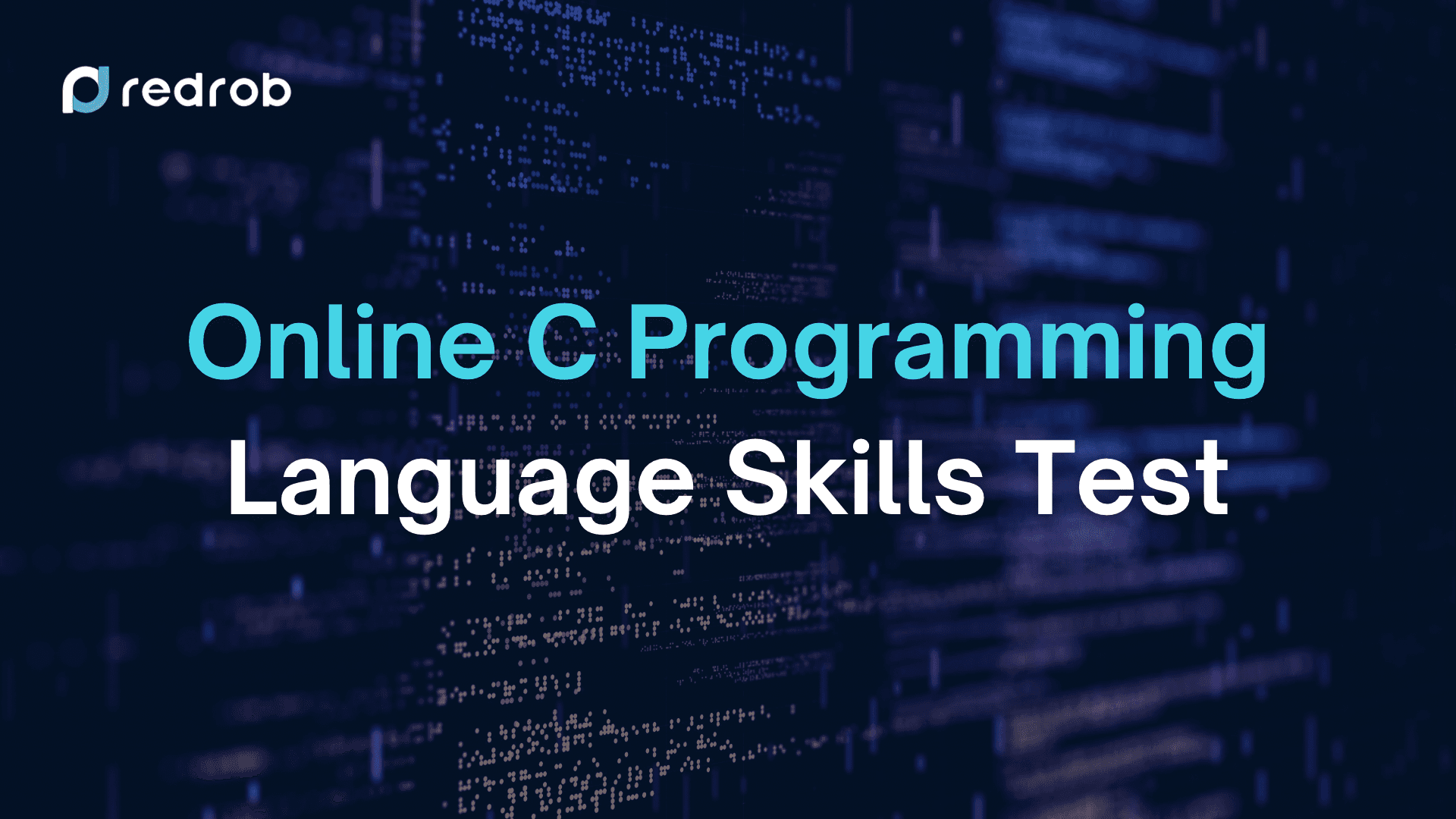Programming Language Skills Test
7 mins read
•
Oct 29, 2024

Soumyata Singh
C programming remains one of the most essential languages in today’s tech world. It powers everything from operating systems to embedded systems, making it vital for developers. As a job seeker or employee, your ability to write efficient C code can set you apart. This is where a C programming skills assessment comes in handy.
Skill assessments help gauge your real-world proficiency in the language. They go beyond theory and evaluate your ability to solve practical problems. Employers value these tests as they streamline hiring by identifying qualified candidates faster. For you, online assessments offer flexibility and a chance to demonstrate your expertise from anywhere.
Let’s explore the key aspects of C programming skills assessment. You’ll learn why these assessments matter, what they test, and how to succeed.
Why is C Programming Skills Assessment Crucial?
A C programming skills assessment is essential for both developers and hiring managers. It provides a clear understanding of your coding ability and ensures you can meet the demands of real-world software development. For companies, it simplifies the hiring process by highlighting the right talent for technical roles.
Importance of Assessing C Programming Skills in Software Development
C programming is the backbone of many critical applications, from operating systems to embedded systems. Assessing your C programming skills ensures you can handle complex coding tasks with precision. Many projects rely on developers who can write efficient, bug-free code.
In systems programming, C is used for resource management. A skilled C developer must understand how to handle memory effectively, as improper memory management can lead to system crashes. According to a Stack Overflow survey, 20% of developers use C in their work, making it crucial to verify skills before hiring.
Benefits for Hiring Managers and Candidates Alike
Both hiring managers and job seekers benefit from C programming skills assessments. For employers, it ensures that candidates have the necessary coding knowledge before they even step into an interview. For you as a candidate, it’s an opportunity to prove your skills in a competitive job market.
For Hiring Managers:
Efficient screening of large candidate pools.
Data-driven insights into a candidate's coding abilities.
For Candidates:
A chance to demonstrate real-world coding abilities.
Objective feedback that helps improve future performance.
How Assessments Help in Identifying the Right Talent for Technical Roles
C programming skills assessments help identify talent that goes beyond theory. These assessments focus on practical, hands-on coding challenges, ensuring that only the best developers are selected for technical roles. A candidate may have a strong resume, but without a skills test, it’s hard to assess if they can solve real-world coding problems.
Moving ahead, let’s dive deeper into the core components of a C programming skills assessment to understand what these tests cover.
Components of a C Programming Skills Assessment
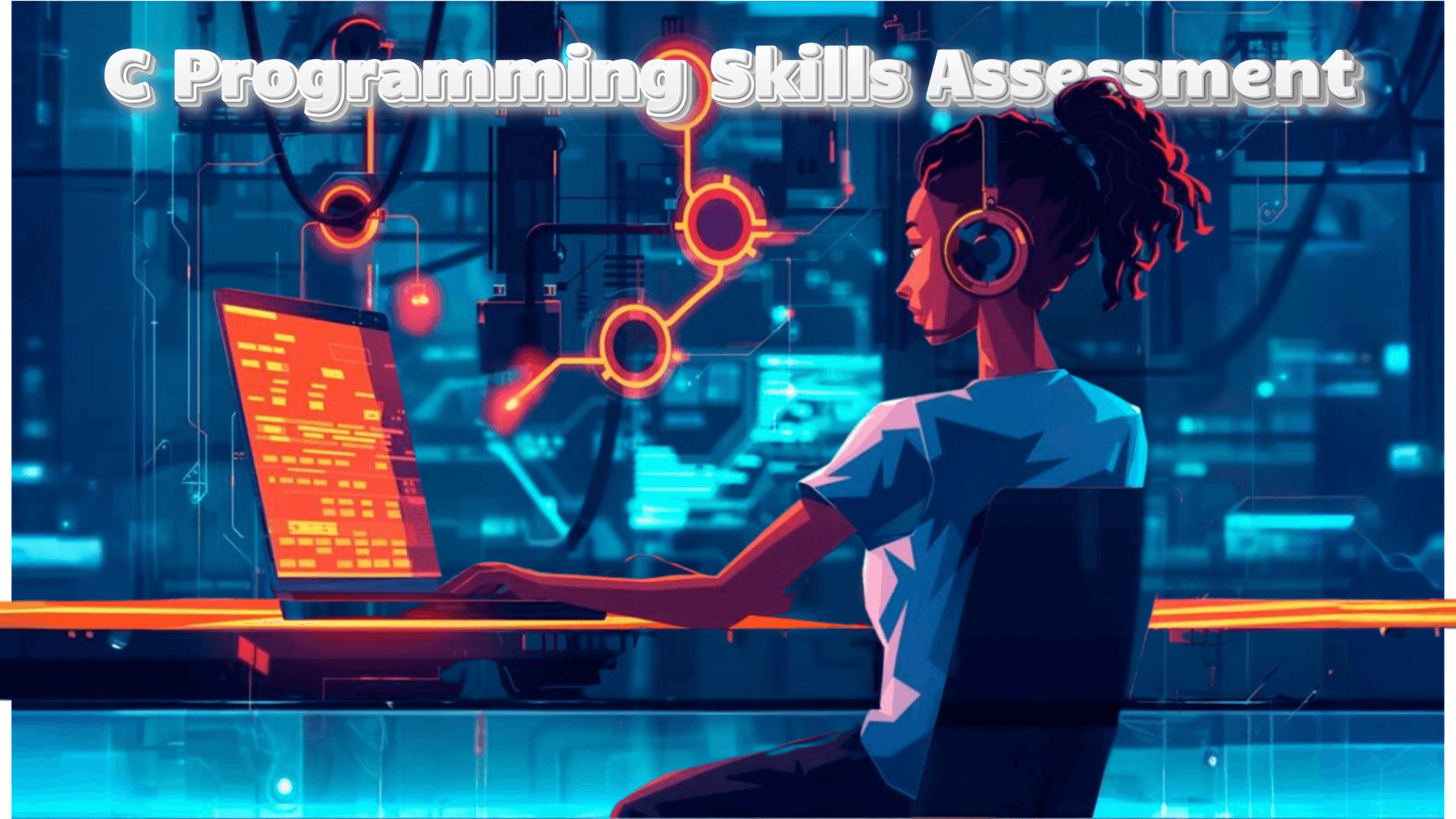
A C programming skills assessment covers various levels of coding knowledge. From basic to advanced concepts, it evaluates how well you can write efficient code, manage memory, and solve problems. Each section tests a specific set of skills that are crucial for technical roles in software development.
Basic Concepts
At the core of any C programming skills assessment, basic concepts like variables, data types, and loops are tested. These fundamentals ensure you understand the building blocks of C programming.
Variables and Data Types: You’ll need to declare variables correctly and know which data types are suitable for different situations. This tests your ability to manage simple tasks like storing and manipulating data.
Loops: Mastery of loops (for, while, do-while) is crucial in solving repetitive tasks efficiently. You’ll often be asked to write loops that process arrays or handle calculations. A basic test might ask you to write a loop that finds the sum of an array of integers. Although this is a simple task, it demonstrates your understanding of syntax and logic.
Intermediate Concepts
Intermediate concepts delve deeper into C’s functionality. You’ll be tested on functions, pointers, and memory management—three areas that separate beginner coders from those with more experience.
Functions: Functions allow you to create reusable blocks of code. A common test might involve writing a function that performs a specific task, like sorting an array.
Pointers: Pointers are powerful but tricky. In a C programming skills assessment, you may be asked to manipulate pointers to access and modify data efficiently.
Memory Management: Managing memory with functions like malloc and free is critical in C programming. You must ensure that your code properly allocates and frees memory to avoid memory leaks.
Advanced Topics
Advanced topics include data structures, algorithms, and dynamic memory allocation. This part of the assessment evaluates your ability to write optimized code and solve complex problems.
Data Structures: You’ll be asked to implement or manipulate data structures like linked lists, trees, and queues. These tasks test your understanding of how data is stored and accessed in memory.
Algorithms: Sorting, searching, and graph algorithms are common challenges in assessments. The focus here is on efficient problem-solving.
Debugging and Optimization: Writing code that runs efficiently is essential. You may be asked to optimize existing code or debug a faulty program to ensure it runs within time constraints.
For example, you might be given a problem that requires you to write a binary search algorithm or implement a balanced binary tree. These tasks show how well you understand both theoretical and practical coding principles.
Now, let’s explore the different types of online C programming tests and how they assess these components.
Types of Online C Programming Skills Tests
Online C programming skills assessments offer various testing formats to evaluate your coding abilities. Each format serves a specific purpose, from testing theoretical knowledge to practical coding skills. A balanced assessment includes a combination of these types to provide a comprehensive evaluation of your C programming expertise.
Multiple-Choice Questions (MCQs)
MCQs are often the first part of a C programming skills assessment. They focus on concept-based questions to test your theoretical knowledge of the language.
Concept-Based Questions cover topics like syntax, data types, and control structures. They help assess your understanding of core principles. For example, a typical question might ask, “What is the output of the following C code?” followed by a short snippet.
MCQs are a quick way to measure your grasp of C programming fundamentals. They ensure you understand the theory behind coding before moving on to practical tasks.
Code Challenges
Code challenges are a practical way to assess your problem-solving abilities. You’ll be given real-world coding tasks that test how well you can apply your knowledge.
Problem-solving tasks require you to write code that solves a specific problem, such as reversing a string or sorting an array. You might be asked to implement a function that checks whether a number is prime.
In this section of a C programming skills assessment, you’re evaluated on your logic, efficiency, and ability to write clean code. Code challenges test how well you can translate theory into practice.
Automated Testing Systems
Automated testing systems offer immediate feedback on your code. These platforms automatically evaluate the performance and correctness of your solution.
Instant Feedback: Once you submit your code, the system runs it through several test cases. It checks for accuracy, efficiency, and whether edge cases are handled.
Performance Metrics: Some systems also provide performance stats like runtime and memory usage, allowing you to optimize your solution.
Automated testing systems are highly effective in streamlining the evaluation process. They help you see where your code needs improvement and give hiring managers objective insights into your skills.
Combining All Elements for a Balanced Assessment
A balanced C programming skills assessment combines MCQs, code challenges, and automated testing. This approach ensures that both theoretical understanding and practical coding abilities are assessed.
MCQs test your foundational knowledge.
Code Challenges show how well you apply that knowledge.
Automated Testing verifies your solution's efficiency and correctness.
For example, a comprehensive test might start with MCQs to evaluate your understanding of pointers, followed by a code challenge to implement a sorting algorithm, with automated feedback highlighting any optimization issues.
Now that you know the types of tests involved, let’s understand the advantages of taking these assessments online.
Advantages of Online C Programming Skills Assessments
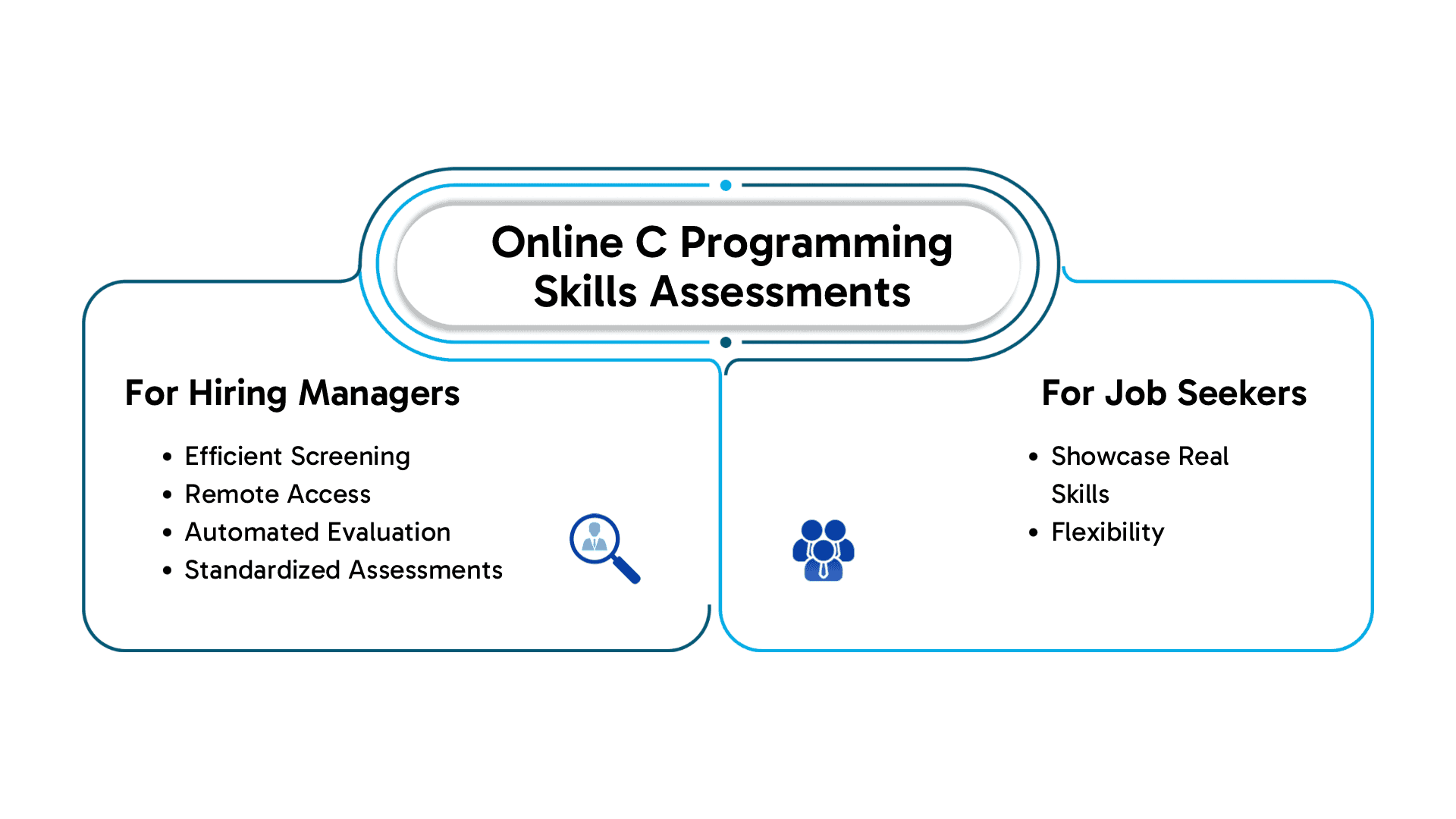
Online C programming skills assessments offer several advantages for both employers and job seekers. These assessments streamline the hiring process and provide flexibility for candidates to demonstrate their abilities from anywhere.
For Employers
Online assessments provide employers with an efficient way to screen candidates. These tests ensure that only qualified individuals move forward in the hiring process.
Efficient Screening: Employers can quickly evaluate a candidate’s C programming abilities. Instead of manually checking code, automated systems handle the bulk of the work.
Remote Access: With online assessments, hiring managers can screen candidates globally. There's no need for in-person tests, saving both time and resources.
Automated Evaluation: Employers benefit from instant feedback on a candidate’s performance. They can immediately see if someone’s skills meet the job requirements without extensive manual review.
Standardized Assessments: These tests ensure fairness. Every candidate is evaluated under the same conditions, reducing bias and improving consistency.
Using standardized C programming skills assessments, a company can screen hundreds of candidates efficiently, identifying top talent faster.
For Job Seekers
Job seekers also gain significant advantages from online C programming skills assessments. These tests offer a chance to show what you can do in a real-world context.
Showcase Real Skills: Online assessments let you demonstrate practical coding skills, not just theoretical knowledge. You get the chance to solve real-world problems, showing your readiness for the job.
Flexibility: You can take the test from anywhere, whether at home or in a café. There’s no need to visit a company’s office, allowing you to focus on the task at hand.
If you're applying for a remote C developer role, an online test shows you can work independently while meeting coding standards.
Understanding these benefits highlights why online assessments are becoming the standard. Now, let’s look at the best practices for acing a C Programming skills assessment.
How to Prepare for a C Programming Skills Assessment
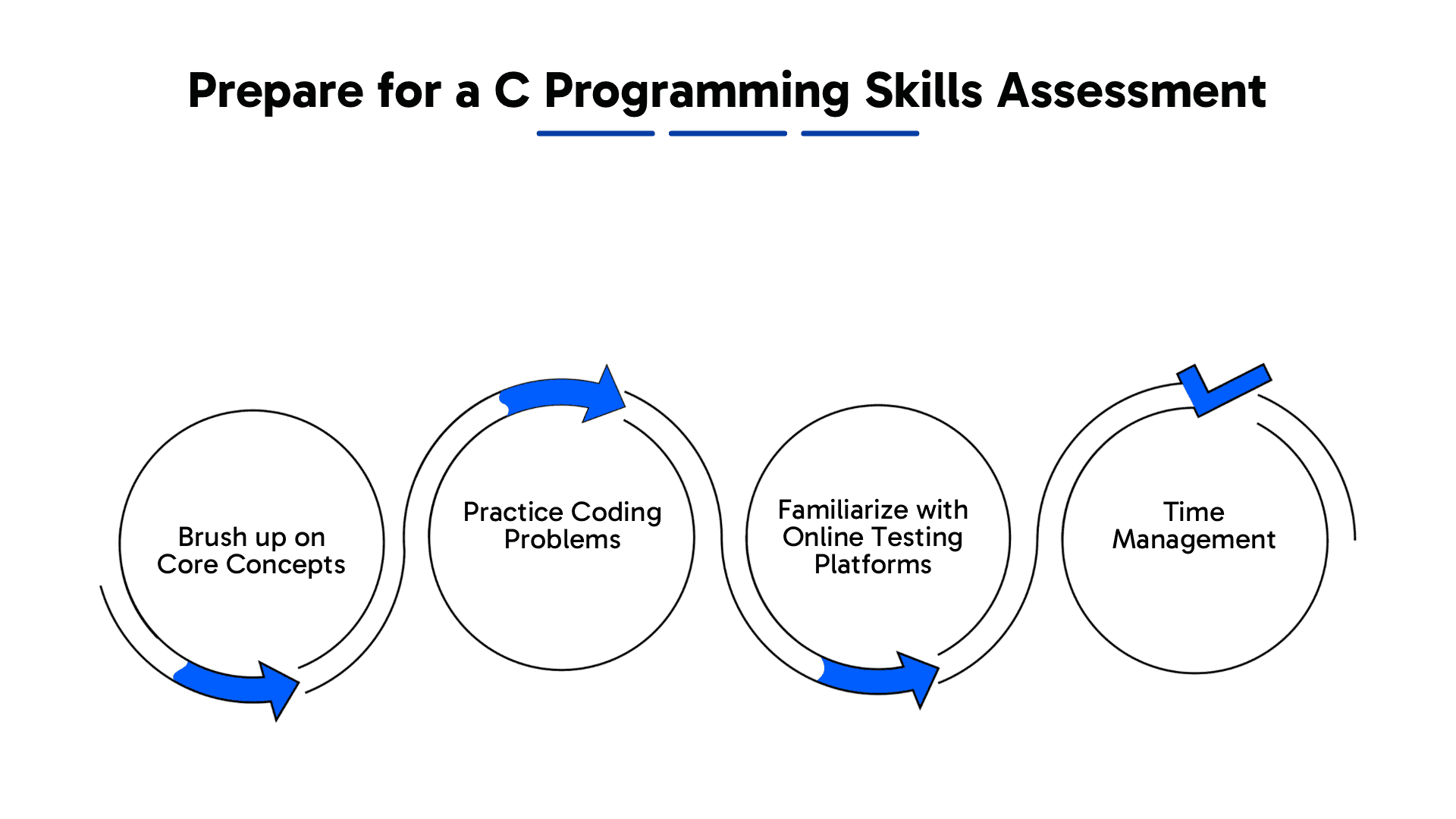
Preparing for a C Programming Skills Assessment is key to showcasing your coding abilities. You’ll need to brush up on core concepts, practice coding, and become familiar with testing platforms. Time management is also essential for success.
Brush up on Core Concepts
Before taking the assessment, review the basics. Focus on core C programming concepts like syntax, data structures, and algorithms.
Syntax: Ensure you understand variable declarations, loops, and conditional statements.
Data Structures: Revise key structures like arrays, linked lists, and stacks.
Algorithms: Refresh your knowledge of sorting algorithms and search methods, as these are often tested.
For example, many online C programming skills assessments will test your understanding of common algorithms like quicksort or binary search.
Practice Coding Problems
The more you practice, the better you’ll perform. Use coding platforms to solve problems daily.
Various platforms offer problem sets that mirror what you’ll face in real assessments.
Start with easy problems and gradually move to more complex challenges to sharpen your skills.
Consistent practice will build your confidence and improve problem-solving speed.
Familiarize with Online Testing Platforms
Most assessments are conducted online. Get comfortable with the testing platform beforehand.
Practice using the interface to understand how to submit code.
Review test formats to know what types of questions (MCQs or code challenges) to expect.
For instance, some platforms may auto-grade your code, while others may require manual submission. Familiarizing yourself with these details will save you time during the actual test.
Time Management
Managing your time during a C programming skills assessment is critical. Divide your time wisely between different tasks.
Plan: Spend the first few minutes reading the problem carefully.
Prioritize: Tackle easier problems first to secure quick points before moving to more complex ones.
Track: Keep an eye on the clock and pace yourself to avoid running out of time.
For example, if a test includes both MCQs and coding problems, aim to finish the MCQs quickly so you can dedicate more time to coding.
By following these preparation steps, you’ll be ready to perform well. Next, let’s look at how employers use C programming skills assessments in their hiring process.
Top Platforms for C Programming Skills Assessment
Finding the right platform for a C programming skills assessment can help you get an accurate measure of your skills or those of potential candidates. Below, we will explore the key features of three leading platforms: HackerRank, Redrob, and Codility. Each offers unique tools designed to assess C programming efficiently.
1. HackerRank
HackerRank is one of the most popular platforms for assessing coding skills, especially in technical hiring processes. It offers a variety of challenges, from basic to advanced, designed to evaluate your coding abilities in multiple languages. For a C programming skills assessment, HackerRank provides both practical and theoretical questions, ensuring a comprehensive evaluation. Its automated grading system and extensive question bank make it ideal for testing your knowledge efficiently. Whether you're preparing for an interview or gauging your progress, HackerRank is a reliable option.
Key Features
Comprehensive Question Bank: Offers a wide range of coding challenges, from beginner to advanced levels.
User Interface: The platform's interface is user-friendly, making it easy to focus on coding.
Automated Feedback: Provides immediate insights on code efficiency, correctness, and performance.
Interview Preparation: It is ideal for job seekers practicing for technical interviews.
With millions of users worldwide, HackerRank ensures reliable C programming skills assessments through its variety of question types.
2. Redrob
Redrob is a modern platform that offers customizable coding assessments tailored to specific job roles or technical requirements. It shines in providing a C programming skills assessment experience that adapts to your needs, whether you're a recruiter or a candidate. Redrob combines an intuitive interface with detailed feedback, allowing you to focus on both your coding performance and your problem-solving approach. Its integration with recruitment tools further enhances its utility for companies, while job seekers benefit from an interactive and practical coding experience.
Key Features
Customizable Tests: You can create tailored assessments based on job roles or skill levels.
Interactive Interface: Its clean and interactive design ensures a smooth testing experience.
Detailed Reporting: Redrob offers comprehensive performance reports that break down code quality, speed, and efficiency.
ATS Integration: Ideal for recruiters, it integrates well with applicant tracking systems to streamline the hiring process.
Redrob’s flexibility and focus on modern testing practices make it an excellent choice for a C programming skills assessment tailored to specific needs. Try It Out! SignUp for FREE.
3. Codility
Codility is trusted by many global companies for evaluating coding skills during recruitment. Its focus on real-world coding tasks ensures that you face challenges similar to those encountered in the workplace. A C programming skills assessment on Codility emphasizes problem-solving in a practical environment, with live coding sessions and detailed feedback. The platform provides an accurate measure of your coding proficiency, especially in timed assessments. If you're preparing for a technical role, Codility offers a comprehensive way to sharpen your skills under real interview conditions.
Key Features
Real-World Coding Problems: Codility focuses on assessing problem-solving skills with tasks modeled after real-world scenarios.
Live Coding Sessions: You can test coding skills in real-time, making it ideal for technical interviews.
Automated Testing: Codility provides instant feedback on code performance, highlighting strengths and weaknesses.
Trusted by Companies: Many top tech firms use Codility for their technical assessments, ensuring a reliable measure of programming expertise.
Codility’s emphasis on practical coding tasks makes it a strong platform for employers seeking a thorough C programming skills assessment.
Understanding the key features of these platforms allows you to make informed choices. Next, we’ll explore how these C programming skills assessments impact recruitment outcomes.
How to Choose a Suitable Assessment Platform
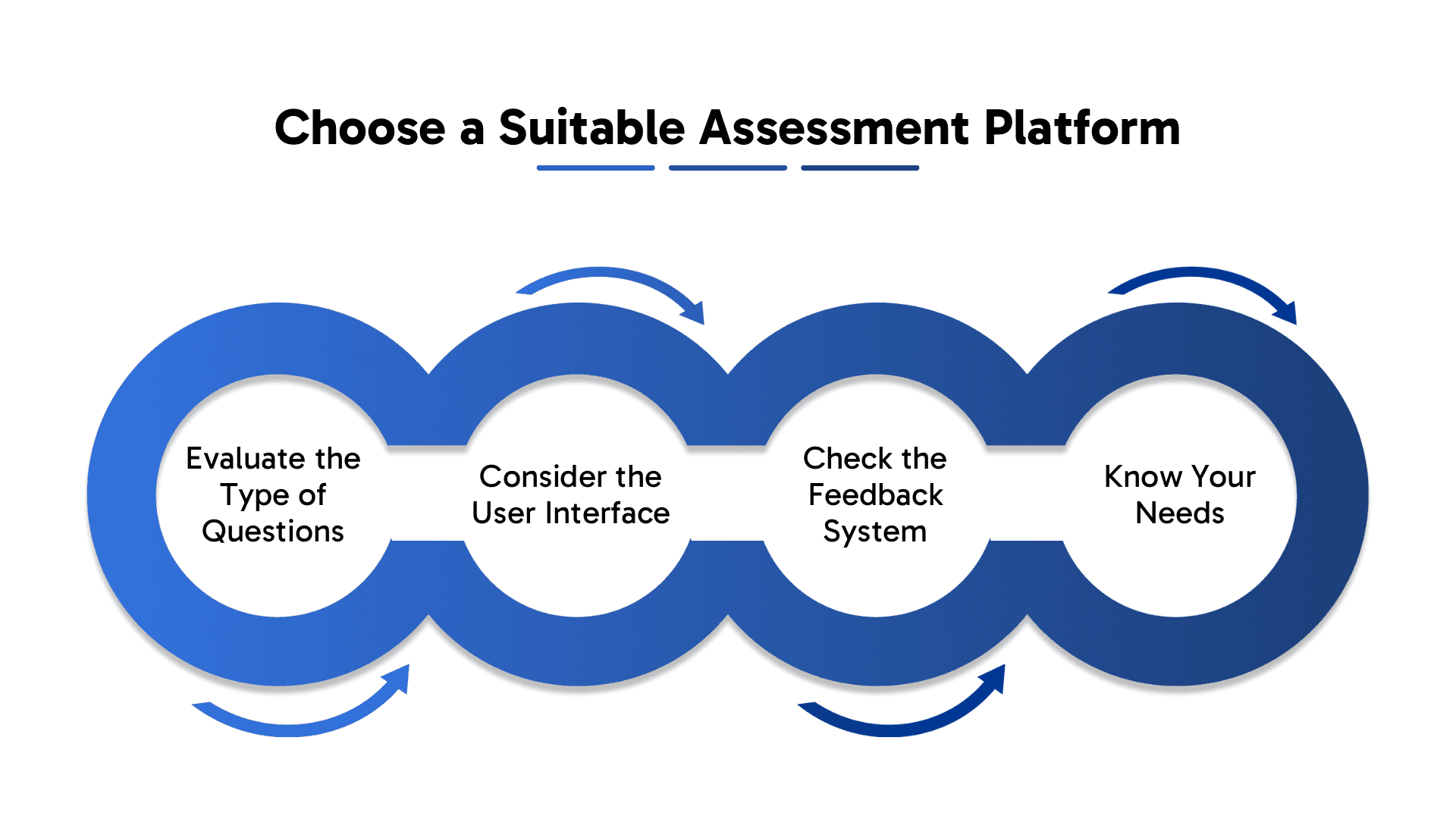
Choosing the right platform for your C programming skills assessment can impact your overall experience and performance. With several platforms offering unique features, it’s important to know what suits your needs. Let’s break down the key factors to consider.
1. Evaluate the Type of Questions
Look for platforms that offer a mix of multiple-choice questions and coding challenges. This will provide a well-rounded assessment of your theoretical and practical understanding of C programming.
2. Consider the User Interface
The platform should have an easy-to-use interface. You don’t want to waste time figuring out how to submit code during a test. Platforms like Redrob are known for their simple and intuitive interfaces, which can be especially helpful if you’re taking the test under timed conditions.
3. Check the Feedback System
Receiving feedback helps you learn from your mistakes. Some platforms provide instant feedback on your performance, while others offer detailed analysis post-assessment. Codility and HackerRank give you instant feedback, allowing you to improve after each test.
4. Know Your Needs
What’s your goal? If you’re preparing for job interviews, go for platforms that simulate real interview conditions like Codility. If you’re trying to improve your programming skills, HackerRank might be more suitable for daily practice.
Selecting the right platform depends on your assessment needs. Whether it’s ease of use or robust feedback, consider what will help you succeed in your C programming skills assessment.
Next, let’s explore some tips for performing well in your assessment, covering essential preparation strategies.
Common Mistakes to Avoid During a C Programming Skills Test
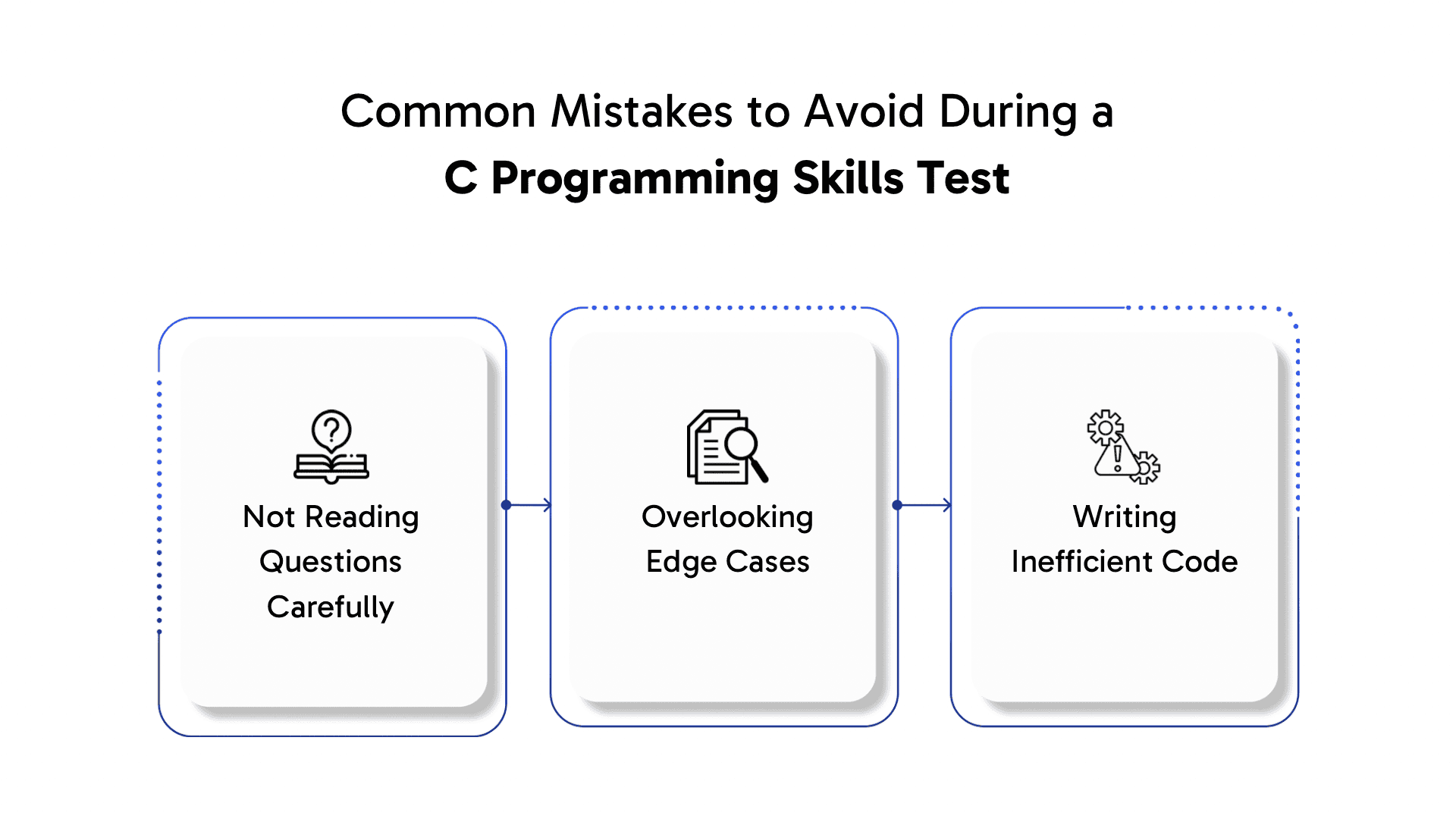
When taking a C programming skills assessment, it’s easy to make avoidable errors. Identifying these mistakes early can help you improve your performance and increase your chances of success. Let’s go through some common pitfalls and how to steer clear of them.
1. Not Reading Questions Carefully
It’s tempting to jump straight into coding, but this is a mistake. Read the problem statement thoroughly to understand what’s being asked. Missing important details can lead to wrong solutions or incomplete answers. Take your time to grasp the input-output requirements before you start coding. For example: If a problem asks for an ascending order output but you miss that detail, your entire logic may fail.
2. Overlooking Edge Cases
Another common mistake is not accounting for edge cases. Edge cases are special input values that may break your code if unhandled. Always test for all possible inputs, including empty strings, zero values, or extreme numbers.
3. Writing Inefficient Code
Writing code that works is important, but it must also be efficient. Many coding platforms impose time limits on tests. Inefficient algorithms may pass for smaller datasets but fail when tested with large inputs.
Tip: Use more efficient algorithms like quicksort instead of bubble sort for sorting problems.
Avoid these common mistakes, and you’ll improve your performance in your C programming skills assessment. Up next, let's discuss effective tips for tackling coding challenges under timed conditions.
Conclusion
A C programming skills assessment is crucial for evaluating your coding knowledge and problem-solving abilities. These tests help you identify gaps in your understanding and offer a practical way to improve. Whether you’re honing your skills or assessing candidates, online platforms provide a valuable resource.
Make use of these tests to stay sharp. Regular practice is essential for mastering C programming. By consistently challenging yourself, you can enhance your skills and stay prepared for any coding test.
